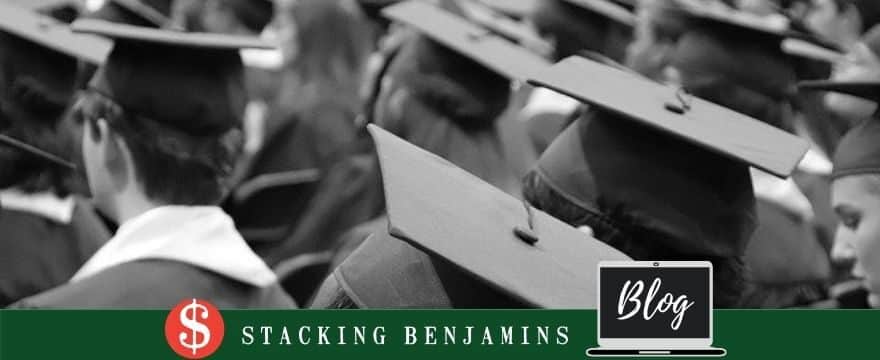Written by: Mackenzie – Lifeat23k
Mackenzie started her site, Life at 23k, to offer realistic and shame-free money advice to low-income and underemployed workers, who are often left out of traditional financial spaces. Her site offers tips on how to budget, save, invest, and break money taboos all while making minimum wage. You can find more on her website, Lifeat23K.com, Instagram, and Twitter.
Learning new things has always been my favorite. If there’s a weird fact about anything, I need to know about it. Even as a kid, I always read extra chapters of textbooks not to be a show-off brainiac, but because I like to know how everything works from A to Z. In some way, shape, or form I’ve always kept that student mentality.
I graduated high school in 2008, which was not the coolest time in the economy. My family wasn’t poor per se but we definitely didn’t have “You’re going to college.” money. I took a few classes here and there but at that time, college just wasn’t for me. I didn’t know what I wanted to learn and I didn’t really have the funds to cover tuition anyway.
Once I turned 28 things started to change a little bit. I still had that “Must learn everything!” drive but going back to school still didn’t sound appealing. At that time I was working as a housekeeper and it was killing me. My body hurt, I was tired all the time and I was really over washing pee sheets every day because one of the kids was too lazy to get up in the middle of the night to use the bathroom. Yes, that was literally his reason. The straw that broke the camel’s back aka my back was the day I was violently ill with norovirus at work and my boss asked me, MID HURLING INTO THE TOILET NO LESS, to finish mopping the floors before I left. And I did it because I needed the money. I knew the second my hand hit the lever to flush that I needed to do something to gtfo of these crappy paying and highly labor-intensive jobs. I was just too damn cute to be living like that.
Between 28 and 30, I switched jobs and finally had a moment to really consider what I wanted to shape my life into. What did I want to direct my focus to that would not just open the doors for better-paying jobs, but that I was interested in enough to do every day? I didn’t really care if I was passionate about it. I only needed to be curious, because curiosity can get you farther than you think.
Finally, a month before my 30th birthday I thought, maybe I should give college another chance.
As weird as being a student again at 30 is, my age is probably one of my best advantages honestly. It granted me a whole treasure trove of experiences that ultimately lead me to be able to get my accounting degree completely debt-free. Don’t worry babes, I’ll tell you the things I had to do in order for this to work.

Do I have the time to do this?
Firstly, I had to consider what kind of time frame I wanted to commit to based on how my life is structured. Setting aside time for classes and homework is hard to do as an adult because we have work and bills and kids and they don’t care that your four-page econ paper is due at midnight. I work full time, have a side-gig, and like, a life. I’m also bipolar and that has a massive influence on my ability to commit to things long-term. If I was going to do this, I needed to set myself up for success and a four-year program would not do that. I decided to work towards just my associates to start. School isn’t going anywhere and if I want to go back to get my bachelors, that’s always an option.
Time also includes how much of a class load you can handle. I ended up choosing a nontraditional style where the terms are only 8 weeks long and we only take one or two classes per term whereas a community college or university has longer terms and you take two or more classes per semester. Again, what is going to set you up best for success? It might not be a traditional full-time course load and that’s fine.
What is interesting enough to learn about exclusively for two years?
The second thing I had to figure out was what the hell I wanted to study for two years. How would what I study translate into being able to ask for more money at a job or being able to work for myself? I was already heavily into personal finance at the time and wanted to delve a little deeper into money. Eventually, I decided on Accounting because the financials of a business are make or break. I’ve worked for small mom-and-pop stores and have seen what having solid finances can do in terms of being able to keep a business running. Having a degree in accounting wouldn’t just mean I could take on more responsibility at my current job and therefore be paid more, but I can also freelance with small businesses to get their books up and running correctly to save them the headache of trying to figure out how the hell to set up a balance sheet.
As I mentioned before, I didn’t need to be passionately in love with the subject. I just needed to be curious enough to want to learn more. Let’s be real, having to learn about absorption costing or variance isn’t, like, thrilling, but it is interesting. At least to me. And there’s a demand for people to know this stuff because it’s complicated and if done wrong…straight to jail. Kidding! Kind of.

How do I go to school without having to leave my house?
Look, to be honest, I’ve always hated classroom settings. I just want to be left alone to learn so online coursework was the most perfect choice for me. Having an online program also meant that I wouldn’t have to adjust my work schedule at all and since my partner and I share a car, there would be no, “Well I have class at this time so I need to drop you off, and then you can pick me up at lunch, etc., etc.” However, I totally get that for some, you might need or prefer the in-classroom environment. It’s just an important thing to consider, especially if you have kids or transportation issues.
What kind of school mascot do I want to be associated with?
Don’t base your choice off that obviously! But, I mean some do sound cooler than others. What I mean is that there are so many options to look at when it comes to any kind of education. There’s community college, state universities, out-of-state universities, self-paced online courses, non-traditional college courses, boot camps, intensives, etc. This is where the bulk of my research was centered and that was because each is so different in its structuring. Education isn’t just accessible in a collegiate environment. Because I had already looked at my time commitment, what I wanted to learn, and how I wanted to learn it, I was able to narrow my search to flexible online programs that were structured enough that I could stay on top of coursework but fluid enough that it wouldn’t clash with my work or home life.
If your local community college checks all your boxes, heck yea! Enroll there! If an out-of-state online program looks like the best for the subject you’re interested in and jives with your work schedule, dooope! Whatever is going to produce the best learning environment for you is great.
A word of caution though, make sure wherever you decide is an accredited school. Wtf does that even mean? It means that the institution and program you’re entering provide adequate training and teachings for that industry. There are a few kinds like institutional, program-specific, regional, and national accreditation. I highly suggest perusing this article from CollegesAndDegrees.com that further explains accreditation and where to look for information on your program.

…and then there’s the bill.
The last reason it took me almost four months to finally enroll in a program was cost. How was I going to pay for all of this? I was only making $15 an hour and that was not going to be enough to cover the $920 per class fee plus books for two years on top of ya know, living expenses. I knew student loans were out of the question. I did not want to be saddled with thousands of dollars of debt just for an AA degree and I wouldn’t be able to pay them back in any meaningful way on my income. So, loans were scrapped. Maybe not scrapped but definitely put at the very bottom of the options list.
A great perk about going to college after 25 is that you’re no longer considered a dependent, meaning things like FAFSA (Free Application for Federal Student Aid) no longer consider your parents’ income in your eligibility. That, my friends, translates into being awarded more funds towards tuition. Federal aid, which does not have to be paid back, covers half of my tuition costs. It put tuition costs in the doable range, but I still wanted to make sure it wasn’t just “doable” but completely affordable.
After talking with a financial aid advisor at the school I wanted to enroll at, they suggested looking into if my employer offered tuition assistance. Sweet Mary, mother of Jesus they did! My boss explained that they would only cover half the cost and a few other parameters and I was set. Now that half I was responsible for after federal aid was applied had also been halved. I could absolutely cash-flow the remaining fourth of my tuition costs. My decade of being financially scrappy just saved me thousands in student loan debt.
Let me tell you, it is such a weight off my shoulder to know that I can get an education without going into debt. Coming from a low income, this was a big fear about doing anything related to higher education. It’s easy enough to tell someone to just take out the loans since you’ll be making more after graduation anyway. We all know that’s not true anymore. And as someone who is very experienced in needing to make a little money last a long time, monthly student loan payments were not even an option even if I did end up with a higher paying job.
Being low income means I’m playing catch-up. Student loan payments would be money I could be putting into retirement or putting money away for my family. I was not going to risk another thing eating away at my income.
Age is not a barrier to learning something new.
Age doesn’t automatically disqualify you from learning. While I’ll admit, studying takes a bit longer now than it did when I was 18, nothing else about being a student is more difficult at 31. In fact, for me, waiting to get my degree has saved me from having student loan debt, gave me experience in all kinds of industries so I feel confident in the program I committed to and allowed me time to have a better sense of myself of what will and won’t work with my lifestyle so I’m not getting burnt out or changing my major every other term.
If you’ve been considering taking the plunge into a scary new learning environment consider those factors I listed earlier. Most importantly, don’t you dare doubt that just because you aren’t fresh out of high school, your ship has sailed. Chances are, you are better equipped now to handle the ups and downs of college life than you were 10, 15, or 20 years ago. Leverage that life experience and enjoy the feeling and benefits of being a student again.


Leave a Reply